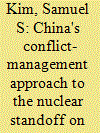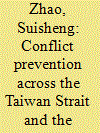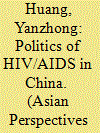|
|
|
Sort Order |
|
|
|
Items / Page
|
|
|
|
|
|
|
| Srl | Item |
| 1 |
ID:
070707


|
|
|
|
|
| Publication |
2006.
|
| Summary/Abstract |
The anti-Japanese demonstrations in China in April 2005 and the Japanese reactions have been characterized as a "clash of nationalisms." This article examines in detail the nature of contemporary nationalism in both China and Japan, taking a number of current issues in the bilateral relationship as case studies. It differentiates between state and popular nationalism and between assertive and reactive nationalism. Focusing primarily on popular nationalism, the authors contend that in both China and Japan, contrary to perceptions within each country that the other country is practicing assertive nationalism, in fact reactive nationalism better encapsulates the type of nationalism that is occurring.
|
|
|
|
|
|
|
|
|
|
|
|
|
|
|
|
| 2 |
ID:
070703


|
|
|
|
|
| Publication |
2006.
|
| Summary/Abstract |
This article provides an analysis and assessment of China's uncharacteristically proactive conflict-management (CM) diplomacy in the U.S.-North Korea (DPRK) nuclear standoff on the Korean peninsula from 2002 to 2005. In the first of four sections, the focus is on the global context and conditions that gave rise to CM studies as a new field of international relations research in the West. The second section argues that three proximate and underlying causes -- greater danger, greater stakes, and greater leverage --catapulted Beijing into the terra incognita of a CM leadership role. The third section examines the shift in China's role as well as the style and substance of this approach. The fourth section critically evaluates the possibilities and limitations of China's conflict-management diplomacy for the resolution of the U.S.-DPRK nuclear standoff. The conclusion is a brief assessment of future prospects for establishing a more peaceful and prosperous regional order in Northeast Asia either through the ongoing Six Party Talks or through some permanent Northeast Asian security regime coming out of the success or failure of the six-party process.
|
|
|
|
|
|
|
|
|
|
|
|
|
|
|
|
| 3 |
ID:
070705


|
|
|
|
|
| Publication |
2006.
|
| Summary/Abstract |
China has developed a unique approach of conflict prevention characterized by liangshou celue -- literally, a "two hands" or a two-pronged strategy. It is a stick-and-carrot approach, involving an oscillating pattern of military coercion and peaceful offensive. After the fourth generation of Chinese leadership under Hu Jintao came to office, an Anti-Secession Law was passed by China's National People's Congress on March 14, 2005. Prescribing the conditions for military action against Taiwan, this law was described by some people in the West and Taiwan as a war authorization law, mainly driven by Chinese nationalism, to set a benchmark against nationalist pressure and show Chinese leaders' willingness to risk war across the Taiwan Strait at all cost. It thus is said to signify not only greater irrationality in China's policy toward Taiwan but also a change in the two-pronged conflict-prevention approach. Is Chinese nationalism in fact a cause of international aggression, making China's policy toward Taiwan irrational and inflexible? Does the Anti-Secession Law signal that Beijing is on a path that reduces its scope for rational choices? This article will explore the making of the Anti-Secession Law to find answers to these questions.
|
|
|
|
|
|
|
|
|
|
|
|
|
|
|
|
| 4 |
ID:
070708


|
|
|
|
|
| Publication |
2006.
|
| Summary/Abstract |
This article questions the notion of "traditional" security by examining security ideas held by policy elites in the Asia-Pacific, particularly in Japan, from the mid-19th century to 1945. It argues that the idea of security of the people was a significant and integral part of the discourse of security during that time. The Japanese case suggests that its implications were not always positive, however. What was problematic was not so much a narrow focus on an external military threat as the way "people" were defined collectively as the nation or national society. As a result, "security" was often used in the context of imperial aggression or wartime mobilization. The article sees the more recent notion of security -- namely, societal security -- as a revival of this historical notion of security, and reinforces the point that in order to avoid its negative implications, current debates need to go beyond the nation-state framework
|
|
|
|
|
|
|
|
|
|
|
|
|
|
|
|
| 5 |
ID:
070704


|
|
|
|
|
| Publication |
2006.
|
| Summary/Abstract |
This article analyzes Chinese foreign policy toward two flashpoints in East Asia: the Korean peninsula and the Taiwan Strait. It argues that there has been an evolution in terms of Beijing's approaches toward these two international crises over time. One can discern three different approaches. First, historical legacies have always played a critical role in the formulation of China's policy calculations and the Korea and Taiwan issues are no exception. I call this the "history-embedded" perspective. Second, with the recent rise of China's economic and political might, nationalism in China has correspondingly been on the rise. National interests have been further prioritized over ideological considerations. This approach can be called "national interest-driven" foreign policy. Third, Beijing has become increasingly confident not only about its strengths in the world arena but also about its ability to coordinate with related powers regarding their various interests. This approach can be called "co-management of international crises" with major powers. The article argues that until recently China has emphasized the first two sets of considerations, but seems to be gradually moving toward a new approach, namely co-management with major powers.
|
|
|
|
|
|
|
|
|
|
|
|
|
|
|
|
| 6 |
ID:
070706


|
|
|
|
|
| Publication |
2006.
|
| Summary/Abstract |
This article provides a political analysis of the sequence and substance of China's policy response toward HIV/AIDS. Using an analytical framework that integrates historical institutionalism with policy process, the article examines how political institutions interacted with three policy streams (problem identification, policy generation, and elite politics) to delay an effective Chinese government response to the HIV/AIDS epidemic. It also demonstrates how the political, problem, and policy streams joined in the 2003 SARS crisis to prompt the government to take decisive action on HIV/AIDS.
|
|
|
|
|
|
|
|
|
|
|
|
|
|
|
|
| 7 |
ID:
070709


|
|
|
|
|
| Publication |
2006.
|
| Summary/Abstract |
The North Korean Human Rights Act of 2004 was an attempt under U.S. domestic law to provide aid and humanitarian relief to and broadcast support for those perceived as suffering from the actions of the North Korean regime. It also aimed to transform the regime and contribute to the peaceful reunification of the Korean peninsula (in a process similar to that which had occurred as a result of the Helsinki Accords with regard to Eastern Europe). However, contrary to serving its avowed objectives, the act contributes little to enhance human rights protection in North Korea and to instigate regime transformation. Rather, the act is more likely to endanger strategic relations in Northeast Asia.
|
|
|
|
|
|
|
|
|
|
|
|
|
|
|
|
|
|
|
|
|